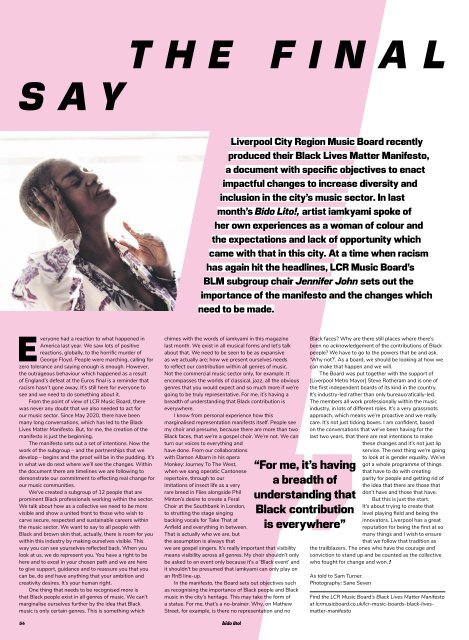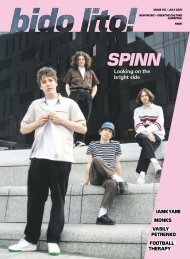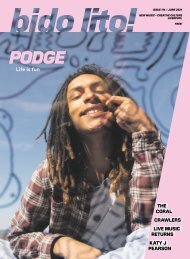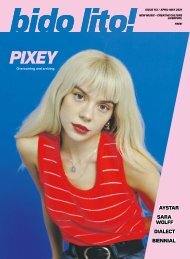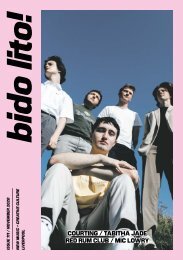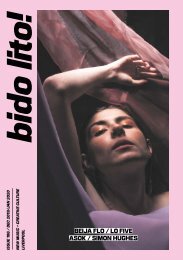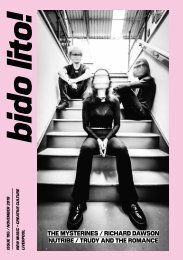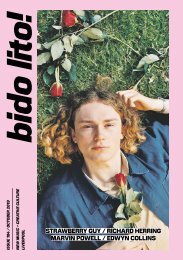Bido Lito! Magazine | Issue 116 | August 2021
LIVERPOOL NEW MUSIC & CREATIVE CULTURE. Featuring: KOJ, DORCAS SEB, WYNDOW, KELLY LEE OWENS, ANDY MCCLUSKEY, LOVE, LIVERPOOL, NATALIE AND THE MONARCHY, HUSHTONES, ALI HORN, NEWS, PREVIEWS, REVIEWS AND MORE.
LIVERPOOL NEW MUSIC & CREATIVE CULTURE.
Featuring: KOJ, DORCAS SEB, WYNDOW, KELLY LEE OWENS, ANDY MCCLUSKEY, LOVE, LIVERPOOL, NATALIE AND THE MONARCHY, HUSHTONES, ALI HORN, NEWS, PREVIEWS, REVIEWS AND MORE.
You also want an ePaper? Increase the reach of your titles
YUMPU automatically turns print PDFs into web optimized ePapers that Google loves.
THE FINAL<br />
SAY<br />
Liverpool City Region Music Board recently<br />
produced their Black Lives Matter Manifesto,<br />
a document with specific objectives to enact<br />
impactful changes to increase diversity and<br />
inclusion in the city’s music sector. In last<br />
month’s <strong>Bido</strong> <strong>Lito</strong>!, artist iamkyami spoke of<br />
her own experiences as a woman of colour and<br />
the expectations and lack of opportunity which<br />
came with that in this city. At a time when racism<br />
has again hit the headlines, LCR Music Board’s<br />
BLM subgroup chair Jennifer John sets out the<br />
importance of the manifesto and the changes which<br />
need to be made.<br />
Everyone had a reaction to what happened in<br />
America last year. We saw lots of positive<br />
reactions, globally, to the horrific murder of<br />
George Floyd. People were marching, calling for<br />
zero tolerance and saying enough is enough. However,<br />
the outrageous behaviour which happened as a result<br />
of England’s defeat at the Euros final is a reminder that<br />
racism hasn’t gone away. It’s still here for everyone to<br />
see and we need to do something about it.<br />
From the point of view of LCR Music Board, there<br />
was never any doubt that we also needed to act for<br />
our music sector. Since May 2020, there have been<br />
many long conversations, which has led to the Black<br />
Lives Matter Manifesto. But, for me, the creation of the<br />
manifesto is just the beginning.<br />
The manifesto sets out a set of intentions. Now the<br />
work of the subgroup – and the partnerships that we<br />
develop – begins and the proof will be in the pudding. It’s<br />
in what we do next where we’ll see the changes. Within<br />
the document there are timelines we are following to<br />
demonstrate our commitment to effecting real change for<br />
our music communities.<br />
We’ve created a subgroup of 12 people that are<br />
prominent Black professionals working within the sector.<br />
We talk about how as a collective we need to be more<br />
visible and show a united front to those who wish to<br />
carve secure, respected and sustainable careers within<br />
the music sector. We want to say to all people with<br />
Black and brown skin that, actually, there is room for you<br />
within this industry by making ourselves visible. This<br />
way you can see yourselves reflected back. When you<br />
look at us, we do represent you. You have a right to be<br />
here and to excel in your chosen path and we are here<br />
to give support, guidance and to reassure you that you<br />
can be, do and have anything that your ambition and<br />
creativity desires. It’s your human right.<br />
One thing that needs to be recognised more is<br />
that Black people exist in all genres of music. We can’t<br />
marginalise ourselves further by the idea that Black<br />
music is only certain genres. This is something which<br />
chimes with the words of iamkyami in this magazine<br />
last month. We exist in all musical forms and let’s talk<br />
about that. We need to be seen to be as expansive<br />
as we actually are; how we present ourselves needs<br />
to reflect our contribution within all genres of music.<br />
Not the commercial music sector only, for example. It<br />
encompasses the worlds of classical, jazz, all the obvious<br />
genres that you would expect and so much more if we’re<br />
going to be truly representative. For me, it’s having a<br />
breadth of understanding that Black contribution is<br />
everywhere.<br />
I know from personal experience how this<br />
marginalised representation manifests itself. People see<br />
my choir and presume, because there are more than two<br />
Black faces, that we’re a gospel choir. We’re not. We can<br />
turn our voices to everything and<br />
have done. From our collaborations<br />
with Damon Albarn in his opera<br />
Monkey: Journey To The West,<br />
when we sang operatic Cantonese<br />
repertoire, through to our<br />
imitations of insect life as a very<br />
rare breed in Flies alongside Phil<br />
Minton’s desire to create a Feral<br />
Choir at the Southbank in London,<br />
to strutting the stage singing<br />
backing vocals for Take That at<br />
Anfield and everything in between.<br />
That is actually who we are, but<br />
the assumption is always that<br />
we are gospel singers. It’s really important that visibility<br />
means visibility across all genres. My choir shouldn’t only<br />
be asked to an event only because it’s a ‘Black event’ and<br />
it shouldn’t be presumed that iamkyami can only play on<br />
an RnB line-up.<br />
In the manifesto, the Board sets out objectives such<br />
as recognising the importance of Black people and Black<br />
music in the city’s heritage. This may take the form of<br />
a statue. For me, that’s a no-brainer. Why, on Mathew<br />
Street, for example, is there no representation and no<br />
“For me, it’s having<br />
a breadth of<br />
understanding that<br />
Black contribution<br />
is everywhere”<br />
Black faces? Why are there still places where there’s<br />
been no acknowledgement of the contributions of Black<br />
people? We have to go to the powers that be and ask,<br />
‘Why not?’. As a board, we should be looking at how we<br />
can make that happen and we will.<br />
The Board was put together with the support of<br />
[Liverpool Metro Mayor] Steve Rotheram and is one of<br />
the first independent boards of its kind in the country.<br />
It’s industry-led rather than only bureaucratically-led.<br />
The members all work professionally within the music<br />
industry, in lots of different roles. It’s a very grassroots<br />
approach, which means we’re proactive and we really<br />
care. It’s not just ticking boxes. I am confident, based<br />
on the conversations that we’ve been having for the<br />
last two years, that there are real intentions to make<br />
these changes and it’s not just lip<br />
service. The next thing we’re going<br />
to look at is gender equality. We’ve<br />
got a whole programme of things<br />
that have to do with creating<br />
parity for people and getting rid of<br />
the idea that there are those that<br />
don’t have and those that have.<br />
But this is just the start.<br />
It’s about trying to create that<br />
level playing field and being the<br />
innovators. Liverpool has a great<br />
reputation for being the first at so<br />
many things and I wish to ensure<br />
that we follow that tradition as<br />
the trailblazers. The ones who have the courage and<br />
conviction to stand up and be counted as the collective<br />
who fought for change and won. !<br />
As told to Sam Turner.<br />
Photography: Sane Seven<br />
Find the LCR Music Board’s Black Lives Matter Manifesto<br />
at lcrmusicboard.co.uk/lcr-music-boards-black-livesmatter-manifesto<br />
54


